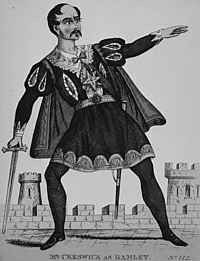
Fall
2001
![]()
Behavioral economist Sendhil Mullainathan adds psychological quirks and foibles to rational economic models
Spotlight on the Center for International Studies
World theater takes center stage at the MIT Theater Arts Program
Kudos to exemplary SHASS staff
The Shakespeare Project leads the humanities into the digital universe
![]()
![]()
Soundings is published by the Dean's Office of the
School of Humanities, Arts, and Social Sciences at MIT
Comments and questions to shass-www@mit.edu
The democratizing quotient
 |
Hamlet beckoned by the Ghost, in a portrait of William Creswick playing the prince at Surrey Theatre, London, 1849. |
The Shakespeare Project
After showcasing the digital wonders of the MIT Shakespeare Project at an international conference at the Sorbonne six years ago, Literature Professor Peter Donaldson was confronted with an extravagant reaction. One conference attendee told him that the presentation was "wonderful, but that it signaled the end of Western civilization," recalls Donaldson. "He said, 'You've just shown convincingly that Mel Gibson's performance can overwhelm the text of Hamlet.'"
That attitude—which the bard himself likely would have considered 'wondrous strange'—is an atypical response to the electronic and pedagogic capabilities of the Shakespeare Project. The first endeavor of its kind and one that is widely lauded, the Project aims to build digital multi-media collections for Shakespeare study. "Because there's a rich history of Shakespeare on stage, in illustration, and in film"—with 700 theatrical film titles and thousands on video, the world's most famous author is also its most filmed—"Shakespeare and multi-media have a natural affinity," says Donaldson. "Shakespeare can lead the humanities into the digital age."
Collaborating with libraries, scholars, and film archives to link text, images, and film, the Project is a leader in promoting digital resources in scholarship and teaching. The thrust is to revive the theatrical dimension, as opposed to focusing solely on a literary understanding of the work. This dovetails with a shift in Shakespeare study—from categorically asserting a single meaning for a text to celebrating complex differences of opinion. The spate of filmed Hamlets in the past decade—Kenneth Branagh in his self-directed work, Mel Gibson in Franco Zefirelli's film, and Ethan Hawke in Michael Almereyda's—reflect wildly different interpretations that digital tools can make accessible. "Shakespeare is the author with the greatest potential for democratizing the teaching of literature," says Donaldson, reminding that "Shakespeare wrote plays for public theater that crossed classes, from top to bottom. And in 19th-century America, Shakespeare was popular art, performed everywhere. [Today] we want to teach Shakespeare in a way that makes it maximally available and adequate to representing the history of its reception."
The Shakespeare Project's five main components include an Electronic Archive of the playwright's entire collection of plays, both text and photos, as well as 1500 Hamlet-related works of art and film; "Hamlet on the Ramparts," single-scene archives for use in elementary, high school, and college education; a Classroom Presentation System, which allows students to access text and accompanying film adaptations, now being updated to DVD; a Shakespeare Video Annotation System, an instantaneous, bulletin board-style internet conversation that promotes collaboration between people who are geographically distant; and Multimedia Essays, which allow students to incorporate hundreds of video clips into their digital "term papers."
The electronic tools clearly enhance the learning experience, says Donaldson, who heads the Literature Faculty. "When reading a text, you create an abstraction in your mind and that becomes your view of what's going on in the play. For some people that's a deep and rich experience. But for others it's inadequate. Comparing your own interpretation to several performances of the same material expands your imagination of what the text can mean," he says, adding that viewing a variety of digitized film clips allows users to stay close to how the meaning unfolds. "It might be a matter of gesture; it might be a matter of camera work. Now we can actually point to those specific moments by which one meaning or another is created in a film."
Donaldson, who recently received the Class of 1960 Award for innovative teaching and research, is now involved in a number of projects aimed at extending the use of digital archives at MIT and at Cambridge University in Britain. In one project, sponsored by the d'Arbeloff Fund for Education, Literature Lecturer Wyn Kelley is collecting manuscripts, images, and sound recordings related to Moby-Dick, whaling, and the rich multicultural history of New Bedford from Melville's time to the present. Such material, Donaldson believes, enhances multimedia education.
The digital revolution is having an equally large impact on the how of teaching, saliently brought out in "Hamlet on the Ramparts," the educational archives used in middle and high schools. "Good high school teachers know a great deal more about teaching than university professors, who have rested on the faith that their professional expertise is automatically conveyed to students. That faith is often justified, but not always. We're in an era where the humanities are being challenged. Part of the challenge—but also part of the creative opportunity—comes from the digital world. It's helping us reexamine essential questions, like what it is we think we're teaching."
![]()
Copyright © 2001 Massachusetts Institute of Technology